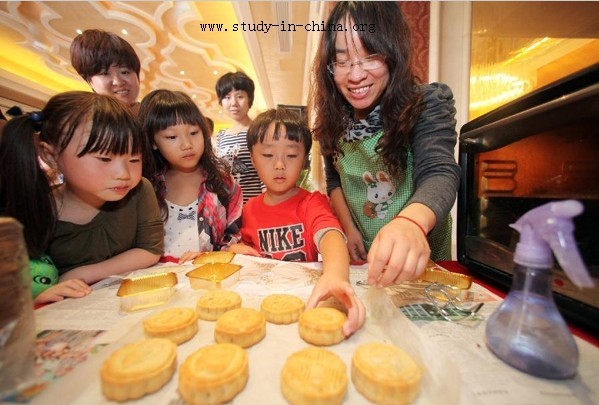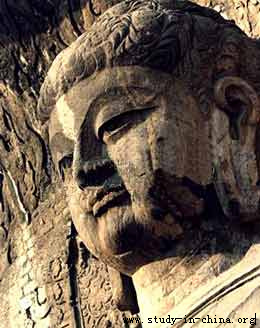| Home > China Feature |
Love it, or Hate it, but You just Can't Escape it

A staff worker shows newly-cooked moon cakes during a Mid-autumn festival celebration activity held in Tianjin, north China, Sept. 11, 2011. Some 100 children from Tianjin and southeast China's Taiwan attended the activity on Sunday.
BEIJING, Sept. 14 – The Mid-Autumn Festival has come and gone but there is no escaping the mooncakes as yet. Whether you're still picking pieces out from between your teeth, or clambering over extra boxes filling the kitchen, there's bound to be some left over somewhere.
Filled with nuts, egg yolk, salted egg, bean paste, and other generic ingredients of the Chinese sweet, mooncakes are small, round, flaky pastries.
Except, unlike other food in China, they are monumentally expensive.
Like the ludicrous Christmas tat that flies around from about August in the United Kingdom (even more so in the United States), mooncakes have become a real commercial spinner. There are lotus mooncakes, ice cream mooncakes, chocolate mooncakes and jelly mooncakes. You can also buy them in Starbucks now. For the real gimmick-hunters, there are even "France mooncakes" (in red, white and blue).
A basic box in a 7-Eleven store will set you back at least 100 yuan ($15.70). In contrast, I ate out recently for 12 yuan. As they would say in the US, you do the math.
To show you really care about your nearest and dearest, however, the cheaper supermarket versions will simply not do. Go gourmet. Maybe, 500 yuan for a box of six.
Yet, despite all the cash that people fork out for "the" accompaniment to their Mid-Autumn tea, the chat around the mooncake is less than positive.
Recent news about the festival has exposed a "mooncake tax". This was foisted on unsuspecting employees who were given "gifts" of mooncakes by their companies. This newspaper quoted an IT worker called Wang Youhua, who was charged 60 yuan in taxes for the box he was given at work. My own boss, in fact, decided to give us all a voucher for the bakery instead of mooncakes to avoid any problems.
Even taste-wise, I have yet to meet a single person who is actively enthusiastic about mooncakes. Unsurprisingly, Westerners sniff haughtily at the dried egg lingering at the core of the little pastries, but they are not the only ones.
The response from my Chinese colleagues ranges from "we eat them EVERY YEAR, I'm sick of them" to "they're so heavy and sweet - urgh" to "They've destroyed weeks of gym work".
One person told me that he came across a box of mooncakes covered in green mold in April that he had hidden in a bout of mooncake fatigue last year. So this year, his wife ordered him not to eat dinner over the festival weekend to leave room for the vast quantities of mooncake that will inevitably fill their house. Apparently, she caught him "accidentally" making noodles, which led to serious trouble.
In fact, the only person I know to speak highly of mooncakes is a certain Chinese friend-of-a-friend who talks about McDonald's in similarly airy, worshipful tones. I would take her opinion that both these things are "so, so magnificent" with a proverbial pinch of salt.
And yet every second person I saw last week on the subway or strolling down the street was clutching a snazzy-looking bag of the darn things.
I reckon we've got a Chinese equivalent of the Christmas turkey or Crimbo pudding here, folks. We know we should get excited - just like we should get excited about the annual exchange of presents, kisses and exclamations of "my, haven't you grown" with Great Aunt Morag.
When push comes to awkward-reunion shove, however, most would be happier with a sandwich and an evening spent watching Glee.
Art
 more
moreChina Beijing International Diet ...
Recently, The hit CCTV documentary, A Bite of China, shown at 10:40 ...

Exhibition of Ancient Chinese Jad...
At least 8,000 years ago, Chinese ancestors discovered a beautiful...

Longmen Grottoes
The Longmen Grottoes, located near Luoyang, Henan Province, are a tr...

Custom
 more
moreWeb Dictionary
Martial Arts
Tai Chi Master Class Held in Moscow
MOSCOW, June 15, 2016 (Xinhua) -- Students learn from Shaolin ...
Celebriting 70 years' efforts in restoring Mogao...
Work is being carried out at the restoration site of cave No 98 a...
Hong Kong Children's Symphony performs in Seattle
Under the theme of Tribute to the Golden Age, a concert featuring a ...





 print
print  email
email  Favorite
Favorite  Transtlate
Transtlate 








